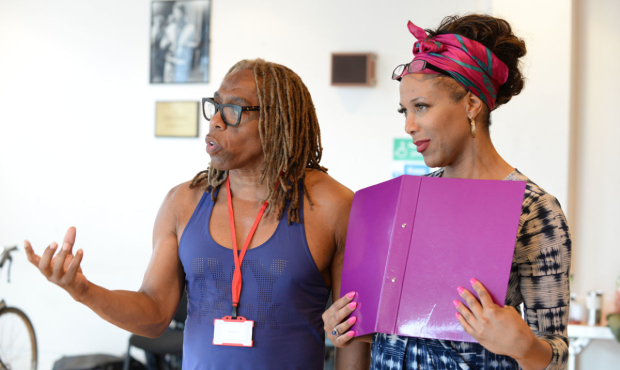Rikki Beadle Blair: 'It baffles Americans that we have a Muslim Mayor of London'
Rikki Beadle Blair’s ”Summer in London” stars an all-transgender cast and deals with the issue of homelessness, but it’s still light and uplifting, he tells Daisy Bowie-Sell

© Sharron Wallace
The writer, director, actor, designer and choreographer Rikki Beadle Blair’s latest play features an all-trans cast and is set in the modern melting pot of London during a scorching summer, here he reveals more.
What would you say Summer in London is about?
It’s a romance about four homeless boys who take turns to take a girl out on a date in the hope that one of them will get her to fall in love with him. If she does, it means that by the winter he will have somewhere to live. It’s a romantic comedy.
So although it deals with issues of homelessness, it’s very upbeat?
Yes, there’s a little edge of something in there. The ghost of those social problems are in there, but they aren’t dealt with too much. It’s a balancing act. When you do a rom-com you are in danger of making light of serious issues. But all the plays I’ve done have taken on big issues. I wanted to do something really uplifting and then still have that core of social realism and social importance in there. But it’s a summer play and the job is to entertain. I really want the audience to feel lifted out of their seats and like they are flying for as much of the show as possible.
Is the play about representing London right now?
It’s a love song to London. London is a tough place, but it is also a very exciting place and is arguably the greatest city in the world. There aren’t many other cities which truly compare in terms of the amount of freedom you have and the freedom to express yourself here. In London, nobody bats an eyelid if you go round with your hair painted all the colours of the rainbow. Almost every interview I read with a designer features them saying they get their ideas from walking the streets of London.
The city has suffered recently from a mix of terrible events – not least the terrorist attacks – is the play an attempt to counter-balance that?
I was born and grew up in London and we suffered terrorist attacks ever since I can remember – all through the ‘70s and ‘80s. A lot goes on when you have this many people close together. When we do have those disasters, there’s a community spirit that’s been here since the war of 'We get on with it, we help each other and we come together'. Is there any other city in the world that would choose a Muslim mayor amidst attacks from extremists? I don’t think so. It baffles Americans that we would do that, but that’s because we understand that a Londoner is a Londoner.
Why did you choose to write your lead characters as homeless?
Just before I came up with the idea for the play, I was helping a friend of mine out. He was homeless and he was sofa surfing. I became really aware of his situation and of the different levels of homelessness. He doesn’t look homeless, he’s high functioning and ambitious, but he’s been homeless for three years. He’s never been able to earn enough money to pay a deposit and when he managed to get into a hostel, he’d have to leave when he got a job. It was a cycle. It really struck me how people are trapped. After seeing a load of young people enjoying the sun in Camden one day last year, I suddenly thought I’d love to do a romance where one of the people would be homeless and the other person didn’t know.
You have an entirely transgender cast, was that really important for you?
Yes, but I wanted to have a story that didn’t revolve around their trans identities – one which wasn’t about them coming out, for example. I thought this story would be really interesting with a trans cast because homelessness is a real problem for trans people, who have trouble getting and maintaining employment and getting support from family.
It seems as though an all-trans cast is rare, is that right?
It is, especially in this sort of theatre, where it’s properly funded and there’s a proper infrastructure. Unfortunately trans actors often get overlooked for roles, because the moment a director realises they are trans, it disqualifies them from the role. It’s a problem which happens everywhere – with women and people of colour too, of course. It’s hard for every actor – even for white, straight, male good-looking men – to have careers in acting, but most of the work out there is made for them.
You’re writing and directing Summer in London, is it easier being the director of your own work?
Yes, just because I often have a vision of what I’m doing and saying and it all clicks together. Often I design my show too – I’m not here, we have some great designers on this. The key for me is to surround myself with people who are unafraid to say: 'This is boring.' I have strong support from Kerry the artistic director at Stratford, who gives notes. But I’ve always directed and written, ever since I was a child. For me, creating a work is like creating an installation.
Summer in London runs at Theatre Royal Stratford East until 29 July.












